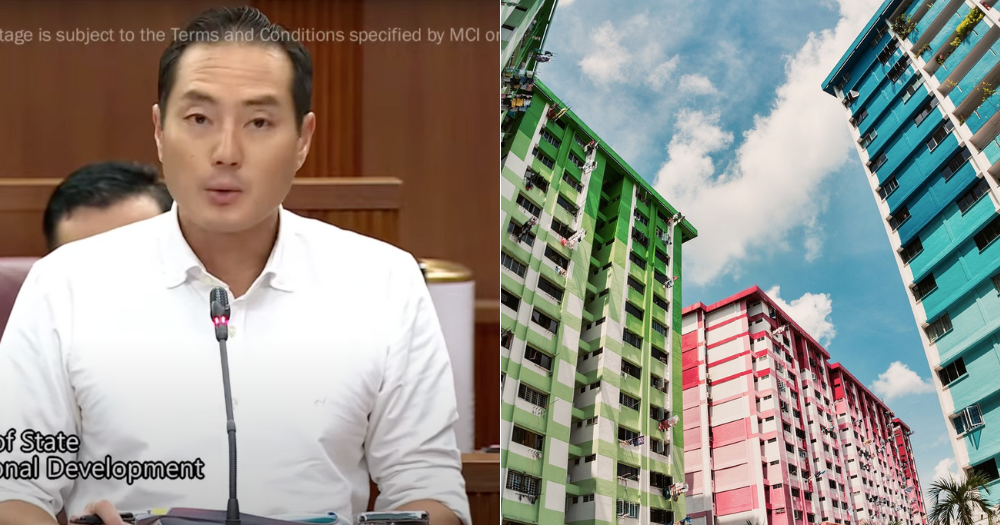With the relaxation of the occupancy cap from six to eight unrelated persons in large HDB flats, residents are concerned about the possible rise in "community disamenity", according to the multiple Members of Parliament (MPs) who raised questions in parliament on Jan. 9, 2024.
Worker's Party MP Pritam Singh and People's Action Party MPs Cheryl Chan and Carrie Tan asked how the Housing and Development Board (HDB) intends to approach issues that could arise from the increase in rental occupancy caps, such as an increase in noise or incessant use of air conditioning units.
In response, Senior Minister of State Tan Kiat How for the Ministry of National Development said HDB takes feedback about disamenities seriously.
"In instances where tenants cause serious disamenities, HDB will take firm action by revoking the approval for the rental of flats or bedrooms," he said.
Tenants only make up 1.5 per cent of all feedback on neighbour nuisance
During the parliamentary session, Singh pointed out that with the revised rental occupancy cap, noise-related complaints could possibly increase.
He then asked if HDB should communicate or educate prospective HDB owners, ensuring their tenants adhere to the recommended quiet hours between 10pm and 8am.
Singh also questioned whether HDB would have sufficient manpower to manage the situation with the possible increase of disamenities caused by having more tenants.
Tan explained that only 1.5 per cent of all feedback relating to nuisance from neighbours is caused by tenants.
"That's why I think we have to also look at the numbers and situate the appreciation on whether there will be a sudden explosion of disamenities," he said.
"But we take all complaints seriously, and we'll continue to work closely with community partners, including town councils," Tan added.
HDB continues working with community partners on neighbourly disputes
Chan pointed out that sometimes disputes between neighbours about noise go unresolved even before the occupancy limit changes. She questioned how HDB manages such a situation, as mediation might be "not enough" at times.
"Tolerance levels, sensitivity to noise, actually is a very complex and multifaceted issue," Tan explained, stating that in most cases, however, "mediation works".
He said HDB takes such issues seriously and will continue working with community partners through different mechanisms to minimise neighbourly disputes.
Availability of recourse available to victims caused by other disamenities
Carrie Tan asked whether there are recourse available to victims of disamenities.
She brought up an example of a disamenity caused by tenants' excessive and incessant use of air-conditioning. She said it could be a health hazard to neighbouring units where residents must deal with mould and spend money to repaint and remove the mould.
She also asked if the government intends to enhance some regulations and enforcement to prevent excessive usage by tenants, which "anecdotally on the ground seems to be predominantly an issue with tenanted units".
Tan explained that when friction arises between neighbours, be it noise or condensation, HDB would take a meditative approach and advise flat owners and tenants to be mindful of causing disturbances.
Tan reiterated that there are numerous existing mechanisms, through mediation or other platforms, where issues can be brought up, discussed and amicably resolved.
"By and large, that approach has worked. It's about being considerate to one another," he said.
HDB flat owners required to seek approval before renting out flat or bedroom
HDB and Urban Redevelopment Authority (URA) previously announced the relaxation of the occupancy cap for larger rental HDB flats and private residential properties.
From Jan. 22, 2024, to Dec. 31, 2026, accommodations will be allowed to house up to eight unrelated persons, an increase from the previous cap of six unrelated persons.
HDB flat owners are required to seek HDB's approval before renting out their flats and bedrooms.
Owners of private residential properties must also register with URA to authorise their properties to accommodate more than six people.
HDB and URA do regular inspections to ensure owners and tenants abide by the terms and conditions of the approval for rental.
HDB will issue written warnings, impose financial penalties, or compulsorily acquire the flat for the most severe cases. At the same time, for private properties, those found to have breached the cap can be fined or imprisoned.
Over the past five years, HDB has taken action against an average of 115 cases of unauthorised renting a year, said Tan.
This includes cases where flat owners have reached the occupancy cap.
URA has taken action against 244 cases per year for breaches of the occupancy cap in private residential properties since 2019.
571 cases of unauthorised renting over past five years
Other than issues relating to the increase in rental occupancy cap, MPs also raised other concerns about HDB rentals.
MP Gan Thiam Poh asked for the number of illegal subletting of HDB flats and private residential properties over the last five years and what measures are in place to strengthen enforcement.
Minister for National Development Desmond Lee replied that there were 571 cases of unauthorised renting out of HDB flats or bedrooms in the past five years.
"HDB takes a serious view of unauthorised renting out of flats and will take action against the owner," Lee said in a written parliamentary reply.
"Depending on the severity and circumstances of the infringement, HDB may issue a written warning, impose a financial penalty of up to $50,000 or compulsorily acquire the flat from the owner."
Lee added that HDB conducts inspections and investigates feedback from members of the public on suspected cases and also publicises the range of actions it has taken against flat owners for unauthorised renting to deter would-be offenders.
However, owners of private residential properties are not required to seek approval from the authorities before renting out their properties.
Top photos via Pixabay and MCI/YouTube
If you like what you read, follow us on Facebook, Instagram, Twitter and Telegram to get the latest updates.



